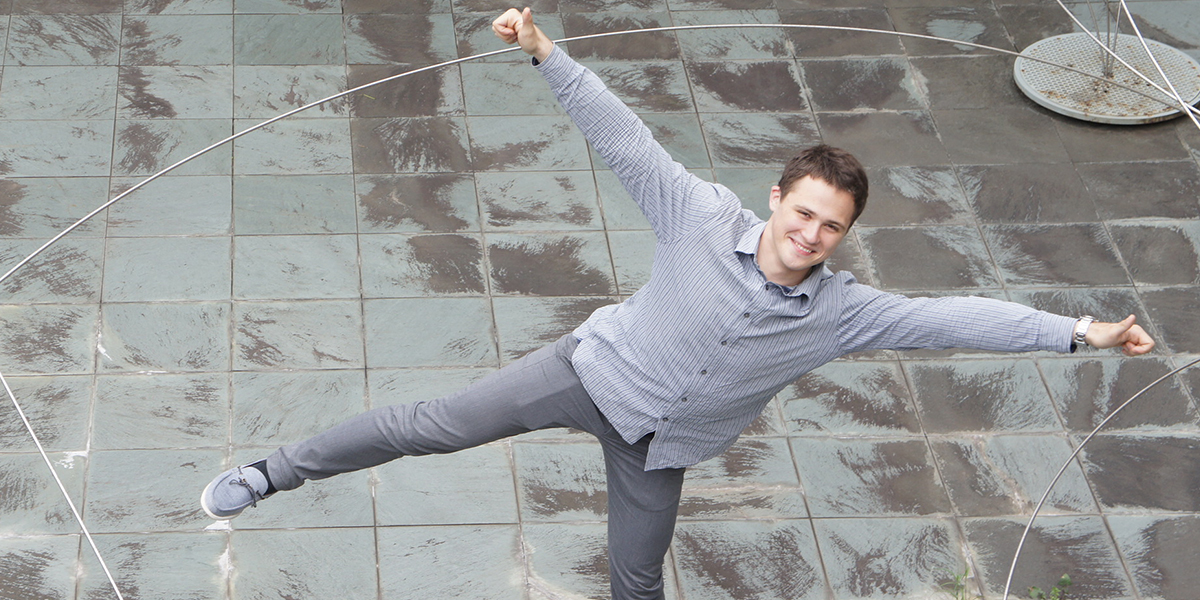
Nothing Excites Me More than Finding Answers
-
- Oleksii Leontiev
- Doctoral degree student, Graduate School of Mathematical Sciences
Area of research: Symmetry breaking operators
Country/Region of Origin: Ukraine
From Ukraine to Taiwan, then Hong Kong and finally Japan
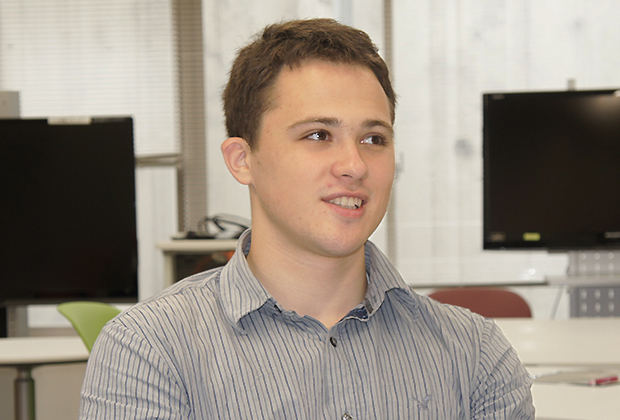
Oleksii chose to study abroad without hesitation after graduating from high school in Ukraine.
Encountering Eastern Culture in Taiwan
The high school I went to in Ukraine had connections with National Chiao Tung University (NCTU) in Taiwan. So, after graduation, I decided to enroll in NCTU instead of a Ukrainian university. In NCTU, I double majored in applied mathematics and computer engineering (programming). Life in Taiwan was quite different from that in Ukraine, so I was very surprised at first. But I got used to it soon and was able to make several Taiwanese friends. I enjoyed student life in NCTU very much. As many people in Taiwan love Japanese culture, I also became fascinated with Japanese culture when I lived there. Gradually, I came to think that studying in Japan would be a good plan. By the way, Japanese culture (for instance, anime and literature) and history (particularly Edo period-related) are actually quite popular among Ukrainians!
Around then, I was working part-time under a Polish chemistry professor named Henryk Witek. He had received a Doctoral degree from the University of Tokyo, and he told me a lot about Japan, UTokyo and even the MEXT Scholarship.
From Taiwan to Hong Kong…
From the moment I knew about the MEXT Scholarship, I became more inclined to study in Japan. My first choice was the University of Tokyo because there was no place in Japan that would offer a better environment for mathematical research. So, I began to collect information by visiting websites related to the University's Graduate School of Mathematical Sciences. I felt that the laboratory of Professor Toshiyuki Kobayashi would be ideal for me because it offered research activities in my field of interest, and also because the professor's website was very informative.
I applied for the MEXT Scholarship as I graduated from NCTU. In Taiwan, university students usually graduate in June. In Japan, though, the school year starts in April, and so does the Graduate School of Mathematical Sciences for the most part. Therefore, I had to wait until the April of the following year. At that time, however, I had already received acceptance letters from the Chinese University of Hong Kong (CUHK) and Tsinghua University. I thought my chance to get the MEXT Scholarship would be low—I didn't think that my Japanese was good enough. So I decided to enroll in a Master's degree program at CUHK rather than waiting until April. At CUHK, I studied geometry but soon realized that geometry was slightly different from what I really wanted to study. I became more convinced that I could study what I really wanted to study at UTokyo.
…And Finally to UTokyo
While studying at CUHK, I continued to contact Professor Kobayashi of UTokyo by email, and one day he gave me an opportunity to take an online entrance examination. Several questions were sent via email, and I was told to send back answers within a few hours. Fortunately, I was accepted to the Graduate School of Mathematical Sciences and also able to get the MEXT Scholarship. Although I felt sorry for my teachers at CUHK, I decided to leave CUHK and enroll in the Graduate School of Mathematical Sciences. In the process of enrollment, a staff member in charge of international students at the administrative office of the Graduate School helped me with every aspect, including administrative documentation. After entering the Graduate School, I visited the administrative office almost every day, where I asked many questions, and everybody in the office kindly helped me.
I can Study What I'm Truly Passionate About at UTokyo
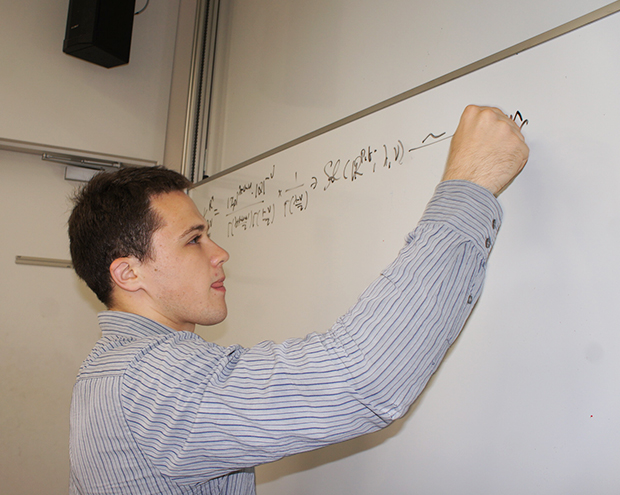 The left part shows four solutions for an equation, which is written on the right. For this equation, four solutions are proposed, and it is rigorously proved that there are no other solutions.
The left part shows four solutions for an equation, which is written on the right. For this equation, four solutions are proposed, and it is rigorously proved that there are no other solutions.
Oleksii joined the laboratory of Professor Toshiyuki Kobayashi at the Graduate School of Mathematical Sciences. He completed the two-year Master's program and is now studying in the Doctoral program at the Lab.
Studying Symmetry Breaking
I am a member of the Kobayashi Lab. There are a total of about eight graduate students (both Master's and Doctoral students) in the Lab, and the most of them are Japanese. The majority of the Master's classes I had to take when I started the program were taught in Japanese. Some professors would write in English on the board, which was helpful to me. I was able to grasp the rough meaning of some of the Japanese the professors wrote on the board, too, thanks to their use of kanji, which share similarities with the Chinese characters used in Taiwan. By the way, about 80% of international students studying at the Graduate School of Mathematical Sciences are Chinese, so I was able to make friends using Chinese as a common language. In general, though, I communicate with teachers and fellow students in Japanese. They are very kind and help me a lot. In the Master's program, I mainly researched symmetry breaking, one of the topics studied in representation theory. The title of my Master's thesis is Study of Symmetry Breaking Operators of Indefinite Orthogonal Groups. During my time as a Master's student, Professor Kobayashi taught me to think for myself instead of relying on others, because doing so will strengthen intelligence.
Having completed my Master's degree, I am now in the Doctoral program and continue to research symmetry breaking at the Kobayashi Lab. I have to take only one class for the Doctoral course and can spend the rest of the time pursuing my research interests. Mathematics is roughly grouped into three branches: algebra, geometry and analysis. Approaches to a problem differ in each branch. The same problem can be viewed and generalized differently in each branch. That is what is so appealing about mathematics. Once a solution is found, the solution can be used as a tool for many different occasions. I try to consider what kinds of solutions can be used for what kinds of occasions. To do so, I use representation theory. This theory is situated in the middle of the three branches of mathematics and draws from the knowledge of all of them, allowing me to consider a problem from many different perspectives. By understanding the characteristics of symmetry breaking, I can learn new things about representation theory and consider existing information in this field from a new viewpoint.
Analysis is the Mathematics Branch for Me
Those who study representation theory possess a wide range of knowledge in the three branches of mathematics and have many useful formulas for finding solutions in their metaphorical toolboxes. However, their understanding of each branch and tool tends to be broad. To tell the truth, I prefer methods for proving solutions that use only one branch. For me, that branch is analysis. I enjoy analysis and want to deepen my knowledge of this area of mathematics.
I became fascinated with mathematics when I was a high school student. I also liked physics at that time, so I planned to study science in university. When deciding on a more specific major, however, I chose not to take physics. The ways solutions are proven in physics are not always absolute, so physics did not really appeal to me. The process of elimination then left me with computer programming and mathematics, and I decided to study both as an undergraduate student. For my Master's degree, I decided to study only mathematics as I considered the programming knowledge that I had gained during my undergraduate years to be enough for practical purposes. In the next three years, I want to research mathematics thoroughly in the Doctoral program to see if I am talented enough to make a career out of it. If I can become a university instructor by the age of 27, I will feel like I can survive as a mathematician.
Should I become a Lecturer or a Programmer?
After completing my Doctoral degree, I want to become a lecturer at a university. At this point in time, I think I am still not qualified to become one, so I will work hard to strengthen my abilities during the next three years. If I can convince myself that I can do mathematics for a living, I want to become a teacher. I have not decided where I would want to work, though. As the economy in Ukraine is not currently favorable, I might want to work in Japan or Hong Kong, if possible. I lived in Hong Kong for about a year, and l liked life there.
As an alternative goal, I think that working as a programmer would also be a good idea. When I was an undergraduate student, I studied programming with a focus on computer graphics. For example, a differential equation is used to create the shading for human facial expressions in computer graphics, which takes a very long time to faithfully reproduce. On the other hand, speed is important for game programming. So, for me, the thrill of programming is reproducing the shading of facial expressions that is close to reality as quickly as possible. This aspect of programming captivates me.
Whether it be in the field of programming or mathematical theory, it would be great if I could provide something that will continue to serve mankind for generations to come.
Navigating through the Language and Culture of Japan
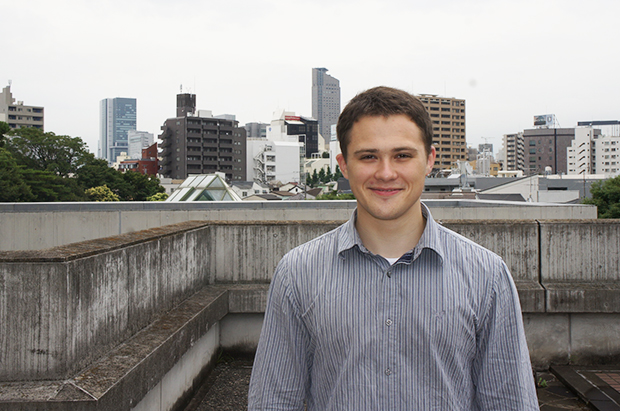
Oleksii started studying Japanese intensively when he was a third-year undergraduate student because of his desire to study in Japan. Now, he enjoys Japanese life with a good command of Japanese.
My Experiences in Taiwan Prepared Me for Life in Japan
As I had studied Japanese very hard, I thought that I would be all right when I came to Japan. When taking graduate-level classes taught in Japanese for the first time, however, I was shocked to discover that I could understand almost nothing. (laughs) I attended the Center for Japanese Language Education classes offered by UTokyo and gradually got used to the environment here where people communicate mainly in Japanese. I still attend classes at the Center, as the teachers are nice and good at teaching. The curriculum is very good, too!
As life in Japan has many similarities to that in Taiwan, I was able to get used to Japan quickly. My first impression of Tokyo was that it is very lively and convenient, and people are polite. I soon became enamored with Tokyo. What surprised me was the complexity of its train systems. Additionally, I was surprised at the prices of things in Tokyo, which I thought were relatively high. I also experienced difficulties that international students studying in Japan tend to experience. For example, clerks in small shops do not speak English well, procedures for renting an apartment are cumbersome, and opening a bank account is challenging.* My fellow Ukrainian student who had already studied in Japan helped me a lot. He gave me useful tips such as where I could buy a futon, tableware and other necessary items.
*The University of Tokyo's International Centers are willing to help international students handle these issues.
I Wanted to Join a Club
My hobbies are programming and sports, particularly weightlifting and skiing. I go to the gymnasium on the Komaba Campus about four times a week to do weightlifting. I notice that in Japan, team sports such as baseball and football are popular, but weightlifting is not so popular. To tell the truth, I wanted to join the University of Tokyo's American football club. I gave up on that idea, though, because I heard from a friend of mine that Doctoral students might find it rather awkward to join the club.*
*In Japan, extracurricular club activities, especially athletic clubs, are usually comprised of and operated by undergraduate students, although graduate students are not excluded.
On weekends, I like to explore places I've never visited before. Also, on Saturdays, I often go to the Holy Resurrection Cathedral in Ochanomizu, Tokyo to attend a worship service. Although the services on Sunday are more popular, I prefer to go to the Saturday service to avoid the crowds. In my free time, I sometimes go to parties organized by Taiwanese or Chinese students. As for music, I like Japanese visual kei bands such as Dir en Grey and Veritas en Void. One thing that I have decided not to do is play video games. I played them too much in my high school days instead of studying, and I do not want that to happen again! Regarding part-time jobs, when I studied in the Master's program, I was too busy to do any. Now that I am less busy, I am thinking about finding a part-time job related to programming.
My Family is My Anchor
When I'm worried about something, talking with my family about it helps to relieve stress. I consult my father, mother and younger sister equally. I am very close to all of my family members. My younger sister is 14 years old, and I have a younger brother, too. He is just four years old, though, so I can't ask him for advice, of course! (laughs) I often talk with my family via the Internet while I am here in Japan. I tell them what's new with me, and I hear about how they are doing.
There is always someone who comes along and helps me when I need it, whether it be my family back home or people here in Japan or other countries. I feel that I am quite lucky in this regard.
Finally, my advice for those who are planning to study in Japan can be summed up in one phrase: really make an effort to study the Japanese language! Understanding Japanese is vital if you want to adapt to everyday life in Japan.
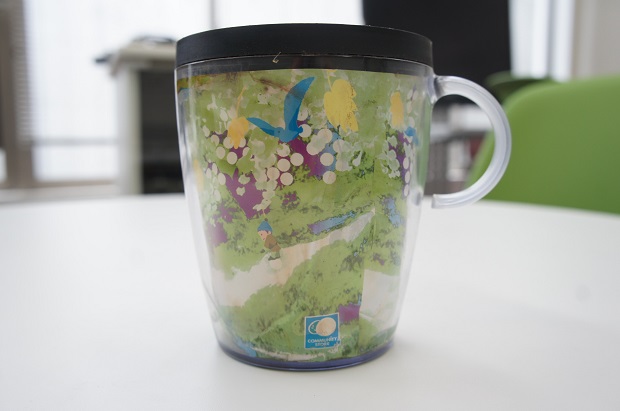
Japanese People Truly are Kind
Insight from a coffee mug
Oleksii brought us a coffee mug that was given to him by a clerk working at a convenience store near the Komaba Campus. When he first came to Japan, Oleksii had the impression that Japanese people are very polite but rather distant. He had not made any close friends yet, and he felt uneasy about his life in Japan. One day, he visited a convenience store near his dorm. At that time, he was not still accustomed to talking to Japanese people in Japanese. However, the clerk treated him very kindly and even presented him with a coffee mug. This event moved him deeply and made him realize that Japanese people are very kind indeed. Oleksii says that this seemingly minor event was the moment when his view of Japan changed drastically. We can learn from his anecdote that even a small episode like this has the power to change one's mental attitude.

I Love Skiing!
Bukovel and Rusutsu
Oleksii loves skiing and hits the slopes every winter. Last winter, in addition to going skiing in Ukraine, he went to the Rusutsu Resort for his first ski experience in Hokkaido. He says he really loves Hokkaido because the snow quality is excellent. As for ski resorts in Ukraine, Oleksii recommends the Bukovel Ski Resort. It is the largest ski resort in Eastern Europe, visited by many tourists from overseas. Its three mountains offer a wide range of ski runs. Bukovel is located along the Carpathian Mountains in the western region of Ukraine and is about an 8-hour train ride from Oleksii's hometown of Kiev.





